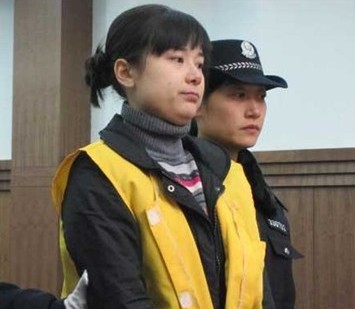Loan reform in the shadows of banking fraud
- By Shui Pi
 0 Comment(s)
0 Comment(s) Print
Print E-mail China.org.cn, April 6, 2012
E-mail China.org.cn, April 6, 2012
Wu Ying, 31, is a businesswoman from Zhejiang Province. At the age of 25, she was already among China's richest women. In 2007, however, she was arrested and charged with financial fraud. She was later found guilty of fraudulently raising 770 million yuan (US$122 million) by promising unreasonably high returns while appropriating those funds for private use, and she received a death sentenced in December 2009. The Zhejiang Higher People's Court affirmed the sentence in January 2012, saying Wu had "brought huge losses to the nation and the people with her severe crimes, and should therefore be severely punished." The decision is currently being reviewed by the Supreme People's Court.
|
|
|
Wu Ying, 31, is a businesswoman from Zhejiang Province. [File photo] |
While Wu's crimes are undisputable, the nature of the monetary transactions involved has sparked heated debates across the country. Many believe that her fundraising method falls in the legal grey area of unregulated private lending practices prevalent in the country's struggling small business circles. Some are concerned the resulted heavy penalty will put a damper on the impending private lending reforms approved by the government.
Ironically, the city Wenzhou in Zhejiang Province was selected as the pilot zone for the reform program by the State Council. With a population of over 9 million and as much as 600 billion yuan (US$ 95.2 billion) of investment capital in the private sector, the city is as famous for its high number of private businesses as their difficulties of financing in recent times.
The reform program aims at creating a database of private lenders and loan transactions, and the State Council assigned Wenzhou's municipal government various detailed tasks. The first among them is to establish a system of oversight to regulate private lending practices.
This task is obviously the most significant, as it clarifies the legality of loan practices by private lenders. Although it will not affect Wu's sentence, it gives her sympathizers hope that there will be fewer similar cases in the future.
It should be noted, however, that the trial run of a regulating system on private lending in Wenzhou does not include the establishment of a private bank. This is regretful, especially considering it would not be the first time a private bank is founded in China.
China Minsheng Banking Corp., Ltd. (CMBC), founded on Jan. 12, 1996 in Beijing, is the first and remains the only national joint-stock commercial bank with shares mainly from the private sector, with a registered capital of 1.3 billion yuan (US$ 206 million). On Dec. 19, 2000, A-shares of CMBC (600016) were listed on the Shanghai Stock Exchange, giving it a total market value as high as 167 billion yuan (US$ 26.5 billion). The bank distinguishes from state-owned banks as it focuses on SMEs, which have become key to the country's continued economic growth. Because of this, CMBC saw its profit increasing by 46 percent in 2011, and its share prices went up by 20 percent against market trend, taking the commercial banking sector by the rein.
Private banks are quite distinct from rural banks, leasing companies and rural mutual credit cooperatives in many aspects.
Professor Xu Dianqing of University of Western Ontario in Canada once clamored for expanding private banks in China by whipping up public opinion and proposing pilot plans, but his efforts ended up in vain. Despite tremendous prospects, CMBC is still the only private bank in China of its kind (small banks and credit unions in rural regions operate differently because of restrictions on borrowers and amounts). This makes it difficult to judge whether Wenzhou's pilot program for financial reform is a step forward or backward. And we can't help but wonder if China will ever have a second private bank like CMBC.
The author is the editor-in-chief of China Times.
(This article was first published in Chinese, and translated and edited by Guo Jiali.)
Opinion articles reflect the views of their authors, not necessarily those of China.org.cn.







Go to Forum >>0 Comment(s)